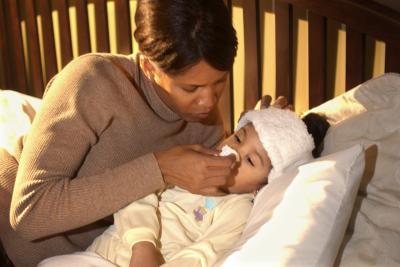While older children can tell you when they feel sick, toddlers may not be able to verbalize how they are feeling. Understanding which symptoms signal the beginning of the flu, rather than a common cold, can help you determine the best methods of treatment. Although the flu is common during childhood, some cases require medical treatment.
Influenza
Influenza, commonly called the flu, is an infection caused by a variety of influenza viruses. According to the Centers for Disease Control and Prevention, these viruses are constantly changing. This type of viral infections spreads through germs, affecting the respiratory tract, including the lungs, nose and throat.
Symptoms
Early on, your toddler’s symptoms may resemble a common cold, causing a runny nose, sore throat and sneezing. However, the flu tends to develop quickly, while colds usually come on gradually. Your child may act cranky and tired. He can run a fever, although not everyone with the flu has an elevated temperature. Your toddler may have a cough, diarrhea, vomiting and show little interest in food.
Prevention
While many people are contagious from the day before symptoms show to about five to seven days after beginning to feel sick, children may be contagious for longer periods. Help limit your toddler’s exposure to influenza germs by keeping him away from sick children and washing both his and your hands frequently. The CDC recommends protecting children over the age of 6 months with a flu vaccine. Antiviral medications may help reduce the length and severity of flu symptoms.
Home Care
The CDC recommends you notify your doctor for flu symptoms in children under the age of 5 years. Keep your child comfortable at home while he recuperates. Encourage your toddler to drink plenty of fluids. Drink enough fluids to produce clear or pale yellow urine. Don’t give your child over-the-counter medications without your doctor’s advice.
Warning
Children under 2 years of age are more likely to have more severe symptoms. Take your toddler to the emergency room or contact his doctor if he doesn’t urinate in an eight-hour period, stops producing tears when he cries, experiences a recurrence of flu symptoms or fails to act more alert or comfortable after his fever goes down.





